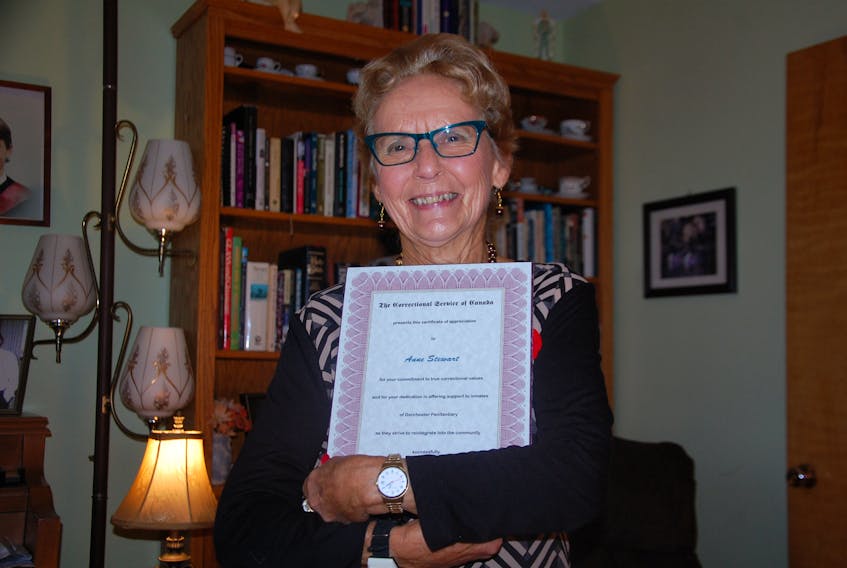MURRAY HARBOUR - Anne Stewart-Hume knew the men had done bad things.
She did not need – or want - to know just what that may have been.
So, she never asked.
They never told.
She just visited the men, in prison, time and again.
Stewart-Hume never once felt she was looking into the eyes or soul of an evil person when she made her way into Dorchester Penitentiary in New Brunswick for one-on-one chats with inmates.
“You would never realize that any of them had any badness in them,’’ she recalls, adding she is still in contact with some of them today.
“I view it as they were my friends.’’
Stewart-Hume, an 83-year-old widow living in Murray Harbour, P.E.I., grew accustomed to some people questioning her kind-hearted action that amounted to roughly monthly out-of-province visits over a five-year period, mostly to Dorchester, but also to Westmorland Institution in New Brunswick and Springhill Institution in Nova Scotia.
Why, one in particular would ask, reach out to people who have committed nasty crimes and, in the process, put yourself at risk?
Stewart-Hume simply ignored such outcry. She did not see the need to defend her action or to lash back.
She would simply walk away.
Such has been her approach to life – all of her life.
She turns the other cheek, never utters a nasty word and is not one to pick a fight or even try to fight back.
Stewart-Hume credits her caring demeanour and stoic nature to a good upbringing. Her parents never raised their voice, or a hand, to her or to her siblings.
“They were so good to us,’’ she says.
“They never hollered or growled at us…they were really, really good people.’’
Her mother, for instance, would think nothing of inviting a total stranger, spotted by the side of the road hitchhiking, to come in the family home for biscuits and tea.
Stewart-Hume could be excused if she grew up feeling spiteful.
She was bullied as a child.
Regularly.
Verbally.
Physically.
Sexually.
She never fought back. She only fled.
Today, at 83, a day never passes without a momentary flashback to those hurtful, frightful days.
Remarkably, she emerged from the childhood-long ordeal strong, caring and compassionate.
Like her parents, she did not judge others.
Not surprisingly, she found her way to work at Riverview Manor in Montague as a nurse’s aid. The residents loved her.
After just a few years there, she left at the direction of her first husband, Bill Stewart, to work at a moss plant in North Lake where he was the boss.
She purchased moss and brought it to the plant. She would heave heavy loads of the moss.
A woman more of strong will than physical strength, she did not complain.
Nor did she make a fuss over working for free when Bill would say he made enough for the two of them.
She also agreed to follow Bill’s lead when he suggested the pair start visiting inmates.
The first trip, in the mid-90s to Dorchester Penitentiary, marked Hume-Stewart’s first time stepping into a prison.
“I wasn’t afraid,’’ she says.
“I wasn’t at all upset going in. I just wanted to befriend them.’’
The inmates were always welcoming and kind to Hume-Stewart.
The talk was simple, every-day kind of stuff.
The impact of the visits, though, was substantial.
Hume-Stewart received a Correctional Service of Canada certificate of appreciation for her “commitment to true correctional values and for your dedication in offering support to inmates of Dorchester Penitentiary as they strive to reintegrate into the community.’’
Correctional Service of Canada recognized her in 2001 as a Canadian Volunteer in a framed certificate signed by then Prime Minister Jean Chrétien.
Rev. Phil Ferris, who served as chaplain at Dorchester from 1988 to 2002, says the inmates liked the couple but were particularly drawn to Hume-Stewart.
They saw her as a mother figure, he says.
She would listen. She would not judge. She did not preach.
“When they knew she was coming, they always wanted to be put on the list (for a visit),’’ says Ferris.
“You never would have known that (she was bullied growing up),’’ he adds.
“She showed no signs of fear, no reluctance to be in a room with anybody. She was just a very kind and trusting soul.’’
Ferris says Hume-Stewart’s personable visits had a way of changing how inmates saw the world around them.
“It’s reconciliation, it’s rehabilitation,’’ he says.
Hume-Stewart feels heartened to know she made a difference in the lives of many inmates.
“I feel good that we were able to go and give them a little strength, a little kindness,’’ she says.
“I can just remember the smiles on their faces when we met up with them.’’
The connection, certainly in some instances, was not fleeting.
Two of the former inmates served as honorary pallbearers at the funeral for Bill Stewart, who died in 2011.
A third prison inmate penned a touching poem in tribute of the couple, which ran on the back of Stewart’s funeral program. Following is a sampling:
“Yes, we are glad you came to visit
Your presence here did give us strength
Think not that we don’t need you
We do need and appreciate your defence.’’
Four former inmates have kept in touch with Hume-Stewart. One even came to P.E.I. with his wife and spent a weekend at Hume-Stewart’s home.
One man that Hume-Stewart used to visit in prison called her about three years ago after he was released. He wanted to chat and see how she was doing.
He still calls, every week, and talks for five or 10 minutes.
“He sees me as a friend,’’ says Hume-Stewart.









